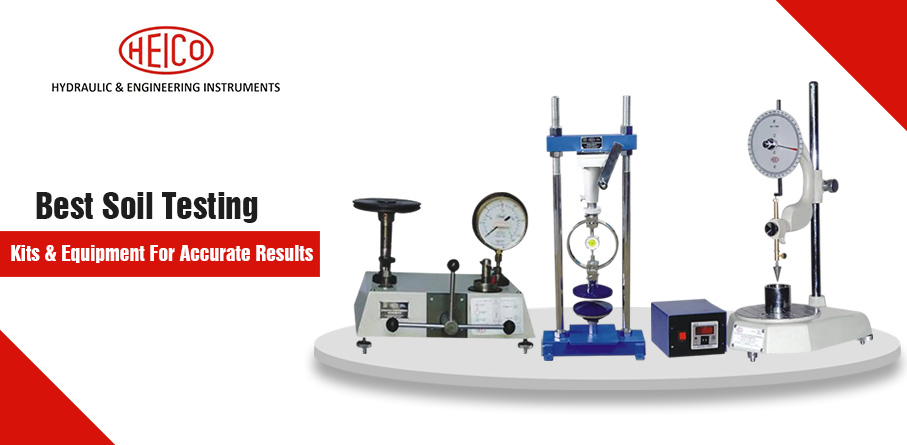Whether you're a farmer, construction professional, or home gardener, understanding your soil’s health is essential for success. Soil testing helps determine nutrient content, pH levels, moisture, and overall composition—factors that directly impact crop yield, structural stability, and land productivity.
To achieve accurate and reliable results, choosing the best soil testing equipment or soil testing kit is crucial. In this guide, we’ll break down the top options, features to look for, and how to select the right soil testing machine for your specific needs.

Why Is Soil Testing Important?
A proper soil test offers insight into:
- Nutrient levels (Nitrogen, Phosphorus, Potassium, etc.)
- Soil pH (acidity or alkalinity)
- Moisture content
- Soil composition (sand, silt, clay ratio)
- Fertility recommendations
Regular soil testing ensures better decision-making for fertilizer application, irrigation scheduling, and construction safety. It helps save resources while boosting output and efficiency.
Types of Soil Testing Kits and Equipment
Depending on your application, you may choose from compact kits for quick testing or a professional-grade soil testing machine for laboratory precision.
Basic Soil Testing Kits (for Home & Garden Use)
These compact and user-friendly kits are ideal for small-scale users like home gardeners and hobbyists. They typically test:
- pH level
- N-P-K (Nitrogen, Phosphorus, Potassium)
- Moisture
Pros:
✔️ Affordable
✔️ Easy to use
✔️ Portable
Top Picks:
- Luster Leaf Rapitest Soil Kit
- Sonkir Soil pH Meter
Digital Soil Testing Kits
Digital kits offer more precision and instant results through LCDs and probe-based analysis. They test:
- Soil pH
- Temperature
- Moisture
- Light level (for plant growth)
Pros:
✔️ Higher accuracy
✔️ Fast and easy reading
✔️ Reusable with minimal maintenance
Professional Soil Testing Machines (Laboratory or Industrial Use)
Used in agriculture research, construction, and geotechnical applications, these soil testing machines are designed for high-volume testing and long-term analysis. They can perform:
- Compaction tests
- Moisture-density analysis
- Permeability testing
- Shear strength evaluation
- Atterberg limits test
Top Equipment Options:
- CBR (California Bearing Ratio) Machine
- Soil Cone Penetrometer
- Triaxial Testing Machine
- Hydrometer Analysis Setup
Pros:
✔️ Extremely accurate and reliable
✔️ Suitable for high-stakes applications
✔️ Compatible with data logging and software integration
Features to Look for in the Best Soil Testing Equipment
When choosing the best soil testing equipment or soil testing kit, consider the following:
- Accuracy: Look for equipment with calibration options and reliable sensors.
- Test Parameters: Choose a kit that covers all essential elements (pH, nutrients, moisture, etc.)
- Ease of Use: User-friendly design with clear instructions is vital, especially for field applications.
- Portability: For on-site testing, compact and durable kits are ideal.
- Data Recording: Some high-end machines offer digital readouts and software for data analysis.
How to Use a Soil Testing Kit
- Collect Soil Samples from multiple locations at root depth.
- Remove Debris & Dry the Sample before placing it in the test container.
- Follow Instructions from the kit, whether using chemical capsules or digital sensors.
- Interpret Results using the included chart or app.
- Act Accordingly by adjusting fertilizer levels, pH, or watering practices.
Soil Testing for Construction Projects
Construction firms rely on soil testing machines for geotechnical analysis. These machines evaluate soil load-bearing capacity, compaction, permeability, and moisture content to ensure foundation safety.
Investing in professional soil testing equipment reduces risk and increases site compliance with engineering and regulatory standards.
Final Thoughts
Choosing the right soil testing kit or soil testing machine can significantly improve your agricultural yield, garden health, or construction safety. Whether you’re looking for a simple DIY option or a laboratory-grade device, ensure you invest in the best soil testing equipment that matches your needs and budget.
Regular soil tests = better decisions, healthier plants, and safer structures.



0 Comments